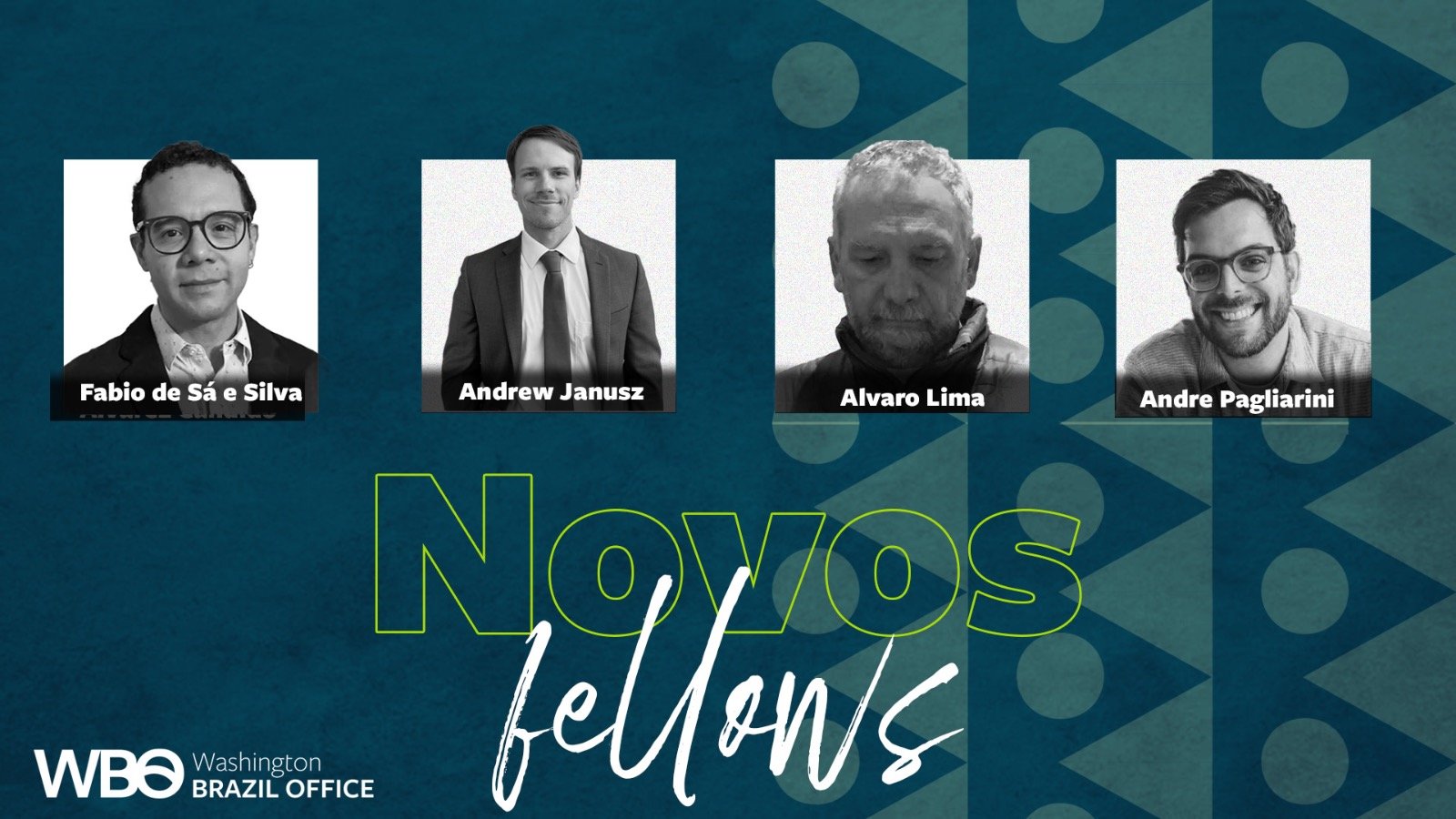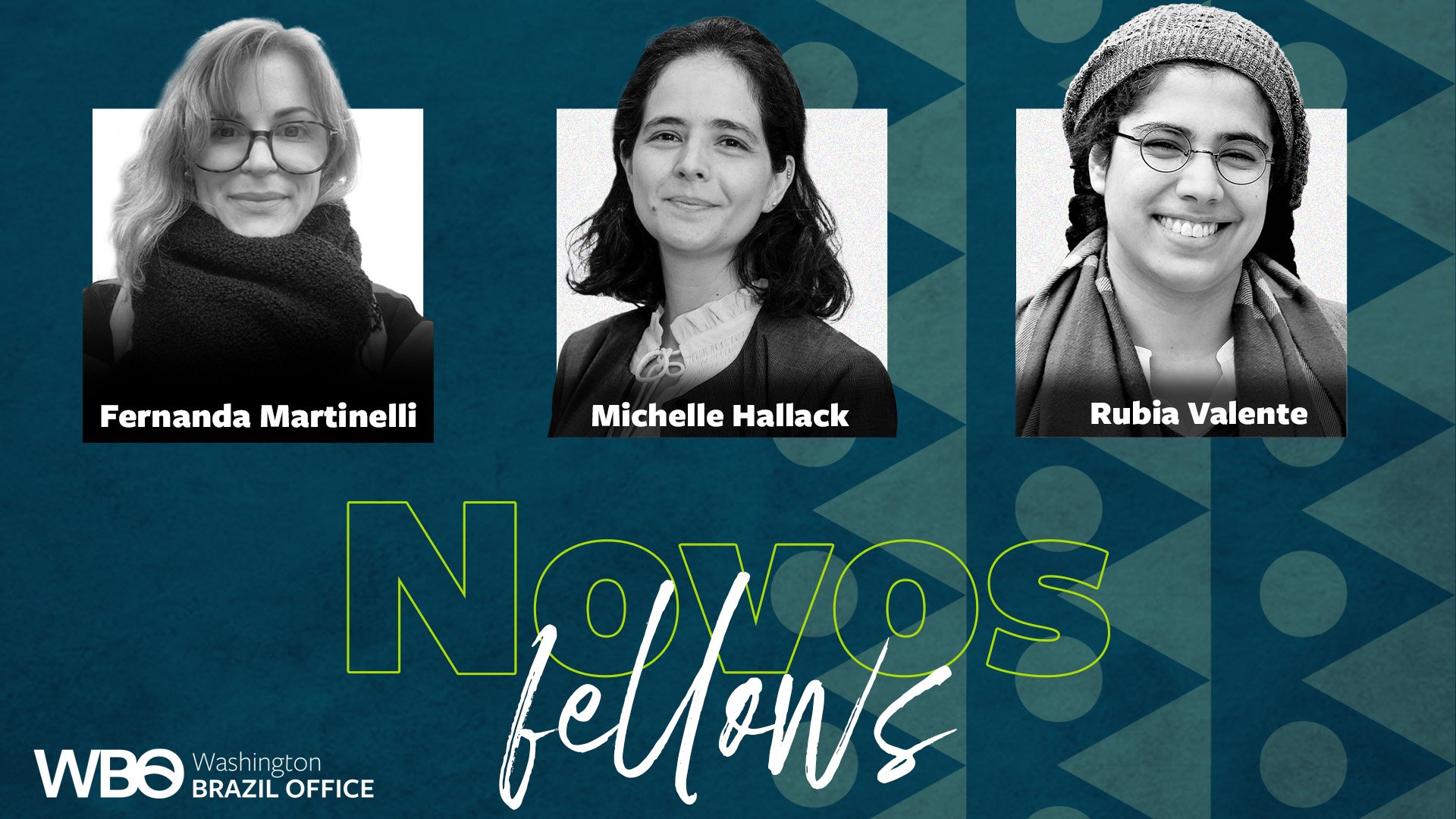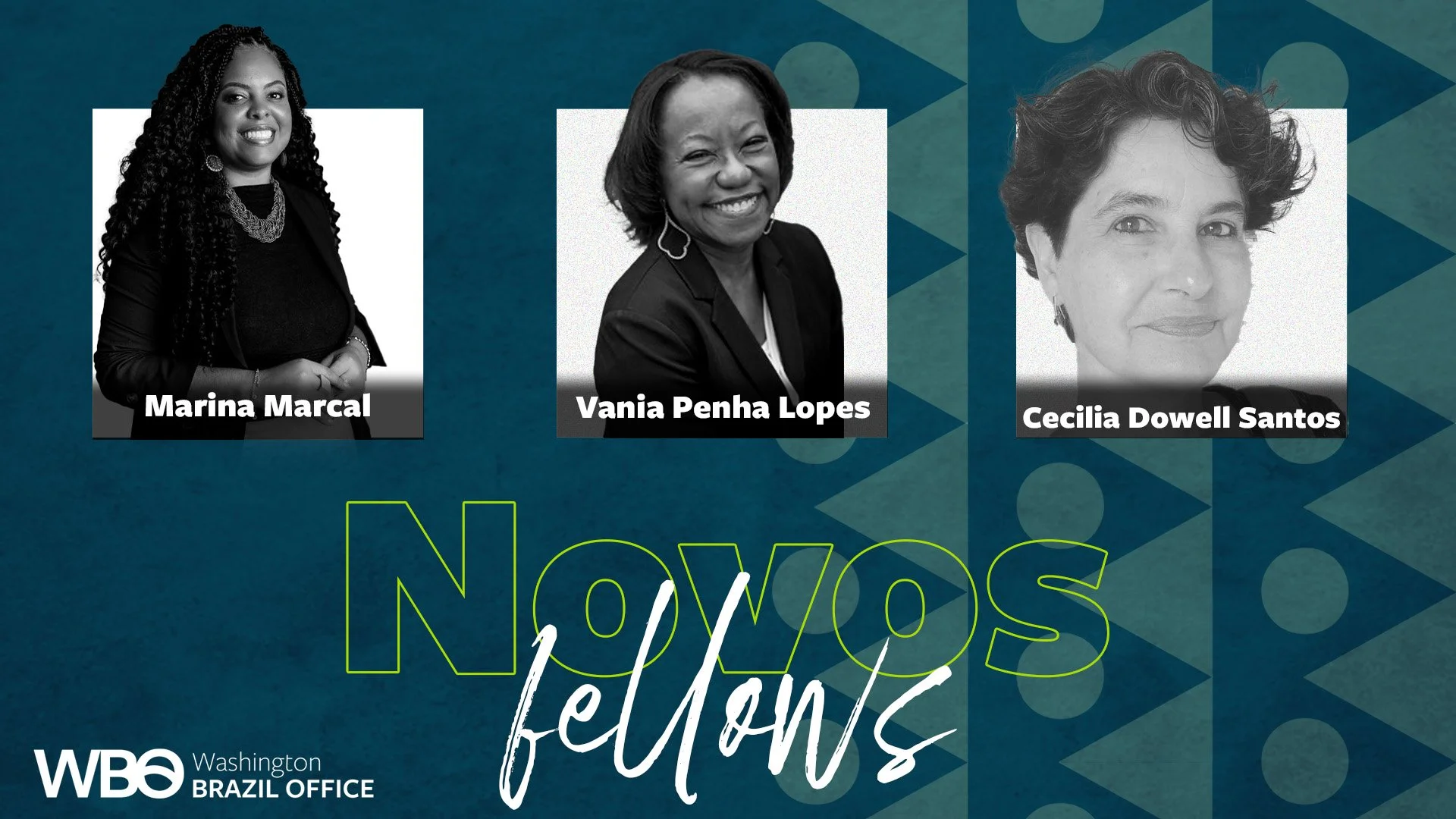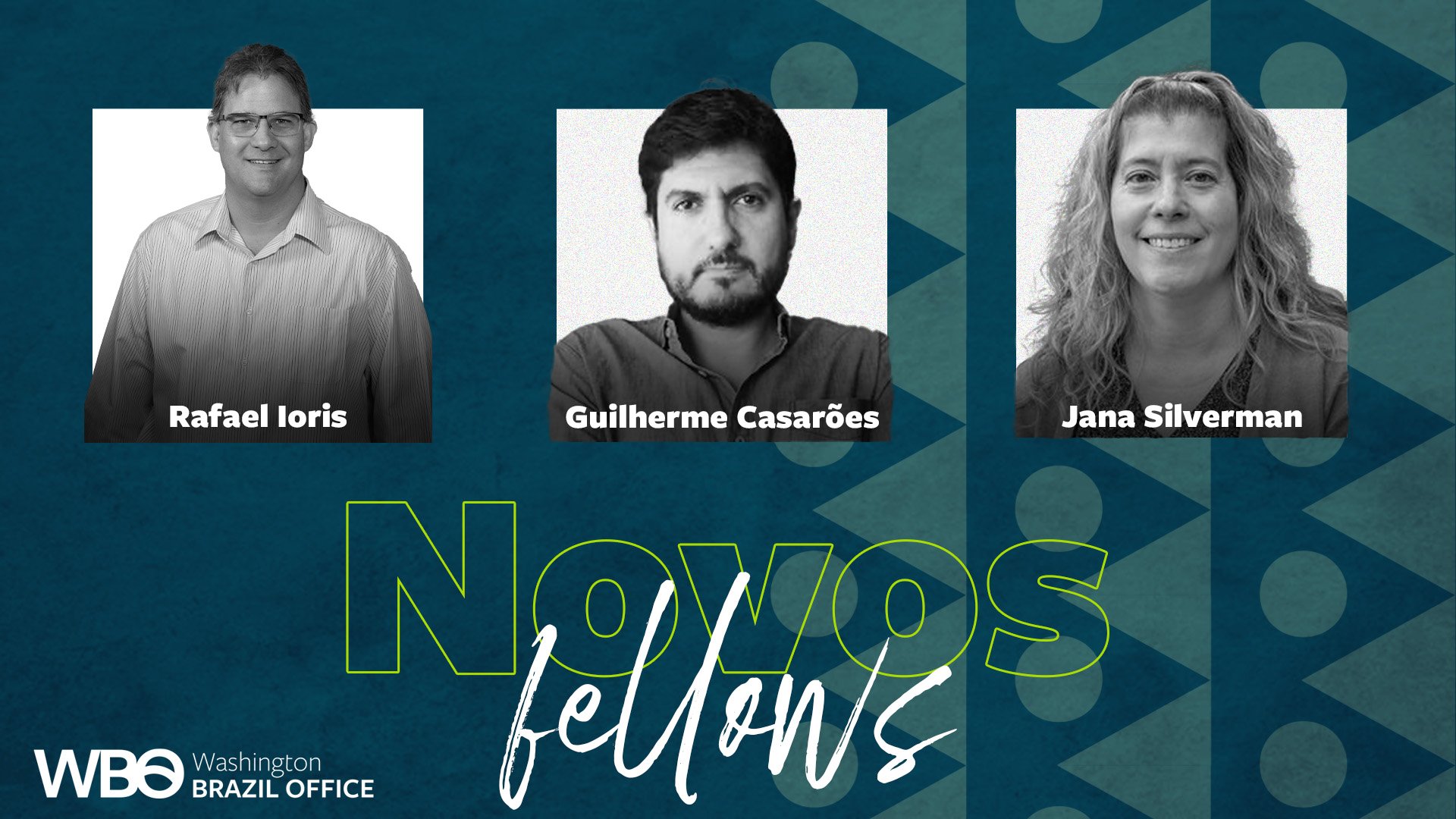WBO presents its nineteen research fellows for 2023/2024
WBO Press release April 25 2023
• Group of researchers will produce articles and organize seminars and other events on the WBO’s main areas of work
• Researchers are also WBO's specialized sources for the Brazilian and foreign press
The Washington Brazil Office (WBO) announced on Tuesday, April 25 the names of the nineteen research fellows selected for the period from March 2023 to February 2024. Ten of them were researchers associated with the WBO in the previous program from 2022 to 2023. The remaining eight were selected as first-time affiliated research fellows. The WBO Research Fellows Program is unpaid and non-residential.
WBO research fellows produce articles in their field of study and expertise, which help to strengthen the areas in which the organization works. They are:
Democracy
Human rights and freedom of expression
Amazon, environment and climate change
Racial equality and overcoming racism
Gender and sexual diversity
Strengthening civic space and protecting social, union, environmental, and indigenous leaders, as well as journalists
Socioeconomic development, Sustainable Development Goals (SDGs) and 2030 Agenda
Defending the rights of Brazilian immigrants in the United States
In addition, fellows propose events in their fields of expertise; participate in panels, symposia, debates and interviews, so that their ideas will reach an ever-increasing number of people in order to influence public debate and contribute to producing positive changes in their chosen fields of research.
The WBO provides mentors, contacts, publishing platforms, visibility and credibility in its capacity as a think tank dedicated to connecting, supporting and carrying out advocacy, producing knowledge, promoting collaborative activities to strengthen civil society, protecting human rights, stimulating sustainable development and socioeconomic status and defending democracy and the rule of law in Brazil.
Who are the research fellows?
David Nemer is Assistant Professor in the Department of Media Studies and Associate Professor in the Department of Anthropology at the University of Virginia. His research areas are the use of technology in marginalized regions, such as the favelas of Brazil and Havana, Cuba, and disinformation studies.
Túlio Ferreira is Associate Professor in the Department of International Relations and the Graduate Program in International Relations at Federal University of Paraiba). He holds a degree in journalism from the Pontificate Catholic University of Minas Gerais and in history from the Federal University of Minas Gerais. He received a Master’s degree and a doctorate in international relations from University of Brasília. His areas of interest include Brazilian foreign policy, the media as a foreign policy actor, and foreign policy analysis.
Michel Gherman is a professor in the Department of Sociology at Federal University of Rio de Janeiro (UFRJ), where he coordinates the Interdisciplinary Nucleus of Jewish Studies. He is a researcher at the Center for Zionism and Israel Studies at Ben Gurion University of the Negev, where he recently completed postdoctoral studies, as well as a researcher for the Far-Right Observatory. He holds a PhD in History from UFRJ and a Master's in Anthropology from the Hebrew University of Jerusalem, where he was a visiting professor. He is a member of the Working Group to Combat Hate Speech and Extremism of the Ministry of Human Rights and Citizenship of the Brazilian government and a professor in the graduate program in social history at UFRJ.
Fábio de Sá e Silva has a Bachelor’s degree law from the University of São Paulo, a Master’s degree in law from the University of Brasília, and a doctorate in law, politics, and society from Northeastern University. He studies the organization of law and legal practice in Brazil and comparatively. His current research agenda emphasizes the role of law and lawyers in democratic backsliding in Brazil, India, South Africa and elsewhere. Sá e Silva also coordinates the Project on Autocratic Legalism and hosts the PALcast podcast.
Andrew Janusz is Assistant Professor of Political Science at the University of Florida. His research focuses on elections and political representation in Brazil. He has published several articles in peer-reviewed publications and is currently writing a book on racial politics in Brazil.
Álvaro Lima is Director of Research at the Boston Planning and Development Agency (BPDA). Most recently, he served as Senior Vice President and Director of Research for the Initiative for a Competitive Inner City (ICIC). A political economist by training, he was head of the Economics Department of the Ministry of Industry and Energy in Mozambique and coordinator of regional development projects at the Institute of Social and Economic Research (IPARDES) in Brazil. He is also the founder of the Instituto Diáspora Brasil. Alvaro holds a master's degree in political economy from the New School for Social Research. His areas of interest include transnationalism, citizenship and human rights, cross-border political representation, and participation and immigrant integration in the labor market.
Andre Pagliarini is Assistant Professor of History and a member of the Wilson Center for Leadership in the Public Interest at Hampden-Sydney College in Virginia. He is author of numerous articles on Latin America for academic and non-academic audiences in venues such as Latin American Research Review, Latin American Perspectives, New York Times and The Guardian, as well as the Folha de São Paulo and Piauí in Brazil. A 2022-23 Fulbright Scholar, he is currently working on three books: the first focuses on nationalism in Brazil, the second on Luiz Inácio Lula da Silva, and the third on mass politics in post-independence Latin America.
Fernanda Martinelli is Associate Professor in the Department of Communication at the University of Brasília and received a doctorate in communication and culture from the Federal University of Rio de Janeiro. Between 2019 and 2020 she was a Visiting Scholar at Brown University. She conducts research on consumption and material culture, with a focus on inequality, development, and social change. She has carried out field work in different parts of Brazil and abroad, and since 2018 she leads the research group “Communication and Material Culture.”
Michelle Hallack has over fifteen years of experience in the energy industry, working to bridge the gap between cutting-edge knowledge and policy-driven decision makers. She was Professor of Economics at Fluminense Federal University and an advisor at Florence School of Regulation. Recently, she coordinated knowledge and product teams for multilateral institutions. As a result of academic and policy-oriented research over the past ten years, Michelle has co-authored 27 articles in peer-reviewed journals. She has also participated in eight book chapters, over 40 MDB reports and 30 working papers. Her research interests are energy transition, climate finances, and climate justice.
Rubia Valente is Assistant Professor at the Marxe School of Public and International Affairs at Baruch College, City University of New York. She completed her doctorate at the University of Texas at Dallas in public policy and political economy. Her research applies advanced quantitative methods and socioeconomic theory to investigate the impact of policies on underrepresented and marginalized groups, providing empirical support for policymaking that addresses socioeconomic inequalities due to factors such as race, class and gender on social institutions, policies, educational and religious. She is a member of the Executive Committee of Brazilian Studies Association (BRASA).
Marina Marçal is a specialist in climate policy, legal and social sciences, and gender and ethnic-racial relations. She was a visiting fellow at Columbia Law School's Environment and Energy program in 2022, focusing on climate policy and equity. She is an ecofeminist and a black lawyer, studying for her doctorate in sociology and law in the area of socio-environmental, rural and urban conflicts at the Fluminense Federal University. She holds a Master’s degree in ethnic-racial relations from the Federal Center for Technological Education Celso Suckow da Fonseca (CEFET-RJ). She is a member of the Concertation for Amazon, Climate Reality Project, Columbia Women Leaders Network, and Women Leaders for Planetary Health.
Vânia Penha-Lopes is Professor of Sociology at Bloomfield College and co-coordinator of the Columbia University Seminar on Brazil. Her main areas of research are comparative race relations, affirmative action, and masculinities. She is the author of several books, the most recent being The Presidential Elections of Trump and Bolsonaro, Whiteness and the Nation (2022).
Cecília MacDowell Santos is Professor of Sociology at the University of São Francisco and Researcher at the Center for Social Studies at the University of Coimbra. She has a doctorate in sociology from the University of California, Berkeley, and a Master’s degree in law from the University of São Paulo. Her research interests center on feminist law, policy, and mobilization to address multiple and gender-based forms of violence, as well as transnational legal mobilization for human rights. She is the author of Women's Police Stations: Gender, Violence and Justice in São Paulo, Brazil (Palgrave Macmillan, 2005) and has edited and co-edited several books. She has published numerous book chapters and articles on violence against women, memory and justice, State and transnational legal mobilization for human rights in Brazil and in the context of the inter-American human rights system. She has also carried out research and published a book on transnational legal mobilization in the context of Portugal and the European Court of Human Rights.
Rafael R. Ioris is Professor of Latin American History and Politics at the University of Denver. His research interests are the history of development promotion in Latin America, US-Latin America relations, and the history of modernization in Brazil.
Guilherme Casarões is Assistant Professor at the Fundação Getúlio Vargas Business School in São Paulo, Brazil. With a Master’s degree and doctorate in political science from the University of São Paulo, he also earned a Master’s degree in international relations from the State University of Campinas. He has published several peer-reviewed articles on Brazilian foreign policy and far-right politics.
Jana Silverman holds a doctorate in labor economics from the State University of Campinas (UNICAMP) and is a postdoctoral fellow at the Center for Global Workers’ Rights at Penn State University. She is a researcher at the Center for Union Studies and Labor Economics at UNICAMP's Institute of Economics. Her research interests include labor relations regimes in Latin America, contemporary Brazilian political economy, and domestic work. From 2012 to 2020, she was Director of Country Programs for Brazil at the AFL-CIO Solidarity Center in São Paulo.
Silvio Eduardo Alvarez Cândido is Professor of Organizational Studies and coordinator of the Socioeconomic and Organizational Studies Network of the Amazon Forest (www.resoa.ufscar.br) at the Federal University of São Carlos. His current research addresses the dynamics of markets associated with illegal deforestation of the Amazon rainforest in Brazil, especially the financing, production, and processing of soy and beef.
Tracy Devine Guzmán is Associate Professor of Latin American Studies at the University of Miami. Her research interests include intellectual and cultural history, social and political theory, and cultural production, especially as these fields intersect with issues of race/ethnicity, environmentalism, and animal studies. Devine Guzmán has been involved in political research and advocacy in the Americas for over two decades. She has worked in Brazil and Peru and has conducted field and archival research in Argentina, Bolivia, Guatemala, India, Mexico, Portugal and Spain. She is the author of Native and National in Brazil: Indigeneity after Independence (UNC Press, 2013) and numerous articles and book chapters. She is currently writing a monograph entitled “Transcontinental Indigeneities: Linking the Americas and the Global South” and editing Teaching Indigenous Studies in and of Latin America for the Modern Languages Association. Devine Guzmán serves on the Steering Committee of the United States Network for Democracy in Brazil and is a frequent volunteer with social movements in Latin America. She is a co-founder and co-chair of the University of Miami's Global Indigenous and Native American Studies Working Group (NAGIS).
Rosana Heringer holds a doctorate in sociology and is Associate Professor in the School of Education at the Federal University of Rio de Janeiro. She coordinates the Laboratory for Study and Research in Higher Education. In 2020, she was a visiting professor at the University of Texas at Austin, as a Fulbright Scholar. She was Director of the ActionAid Brazil Office and Director of the Center for Afro-Brazilian Studies at Cândido Mendes University. She is currently a board member of CLADE-Brasil (Latin American Campaign for the Right to Education).







